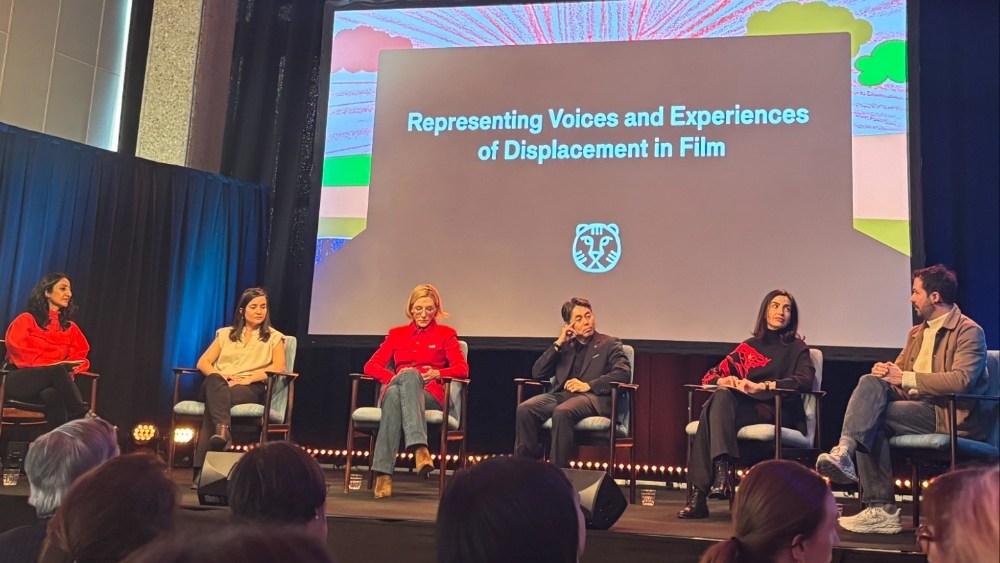Cate Blanchett Talks Newly Launched Displacement Film Fund
Talking about the newly launched Displacement Film Fund at the International Film Festival Rotterdam on Saturday, Cate Blanchett teased: “It’s the beginning of something wonderful.”
“I don’t think it has anything to do with me, but with the urgency of the situation. And yet these stories don’t seem to be getting into the mainstream. These very human stories have been politicized and made toxic. I’ve been a UNHCR Goodwill Ambassador for almost 10 years now, meeting refugees, asylum seekers and displaced people, and hearing their stories. Their lived-in experience has been inspirational to me. Their resilience, courage, their fortitude. Their stories beggar belief.”
As she noted during a panel at the festival, within that period of time, the number of refugees and the displaced has grown exponentially. And yet people who experience it “often feel invisible.”
“There is a stigma around being a refugee. What happens to their careers and perspectives? We don’t want to ghettoize their stories but help them reach the mainstream. The speed with which this initiative has been put together speaks to the desire to engage. The audiences are interested in their stories, and they’re not always given a chance to connect.”
Tamara Tatishvili, head of Hubert Bals Fund, explained that “the vision is to start operating on a pilot scale.” Up to five short films will be financed. A nominating committee will create a list and the selection committee will then take a look into creative concepts of the filmmakers.”
“These films will premiere at IFFR next year,” she said. “We want to amplify these short films as much as possible and unlock access to places for distribution, for circulation, which might not be a traditional landing for these kinds of projects.”
She added: “We will get our hands dirty with it and try to bring it to the next stage. That’s how you innovate.”
They also explained why they decided to focus on short form.
The decision to focus on short film form had to do with creativity, she said. “On this fast-tracked collaboration, we have a clear mission: This is a long game. We want to create a legacy fund. We’ve met a lot of experienced filmmakers who don’t want to be in financing for years – they want to unleash their creativity.”
Blanchett agreed: “We are releasing this fund in a turbulent and potentially exciting time. The audience is hungry for consuming stories in many different ways. The industry, in a lot of ways, is in a freefall, so it’s an opportunity to turn it into something more exciting.” Oftentimes, a feature film becomes “conservative and formulaic,” also because of “that dreaded three-act structure,” threatening its original elements.
“Filmmakers think: ‘A short is a place where I can truly experiment and take risks.’ It’s a dynamic, elastic space. Being a woman in the film industry is not a monolithic experience and nor is being displaced. The amount of belly laughs I’ve had speaking to people in very deprived and challenging environments, the amount of ‘Babette’s Feast’ moments I had with displaced people has been astonishing. Whether it’s a genre film, a documentary or romantic comedy, we don’t have to ‘lecture’ people, because they haven’t been lecturing me either. They have been sharing points of common humanity.”
Syrian filmmaker Waad Al-Kateab, behind “For Sama,” made the film while being displaced herself.
“When Cate mentioned this project to me, I was over the moon. I remembered everything I have been through. It’s urgent, more than ever: Not just for us as a community of refugees but for the world. Everyone can look around and see where this is going, and it’s definitely not getting better. When I made ‘For Sama,’ the first challenge was: ‘No one wants to hear his.’ But it was survival. I wanted to live and accept what happened in telling this story.”
The fund is “really going to make so much difference” for people whose stories would otherwise never be told, she noted. “It’s going to change their lives.”
Jonas Poher Rasmussen, known for “Flee,” underlined the importance of telling “human stories,” first and foremost.
“When I was making the film, I didn’t come from the outside: I was interested in my friend. That fundamental human interest is crucial to telling these stories. I am hoping that people who will get these grants will really surprise us and excite us: not just with refugee stories but with human stories.”
Koji Yanai, both a film producer and a board director of Uniqlo parent company the Fast Retailing Group, stressed that in order to “tackle these issues from multiple angles,” it’s crucial to “join [forces] and unite.”
“As a company, we have contributed and supported refugees for more than 20 years. If this fund would be just a commercial fund, we wouldn’t be interested. But it’s devoted to helping the displaced, to give them a voice and bring them to the mainstream. That is its main purpose.”
Blanchett added: “In the DNA of the initiative is that it’s respecting and understanding that if you are displaced, no matter if you are a filmmaker or not, the thing you are robbed of is your freedom. You don’t have the freedom to think, to dream or to return home. We want to safeguard a little island of creative freedom for these extraordinary artists. It’s a start.”


